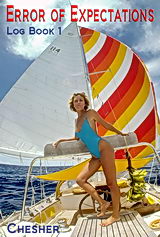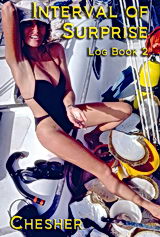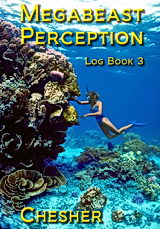Unnamed Island
We spend the morning diving, as usual, and repair to the Moira to write up the results of our search. Today we are anchored behind an unnamed islet. We checked out the coral in the pass on the north side. Not much of anything, and certainly no lapi or even black lip.
The whole area is one huge sand bank with scattered little islets. It is the only place I've ever been where the birds are not terrified of humans. We are still within an easy sail from Kiriwina but nobody seems to frequent the area for fishing.
In fact, Freddy and I have not seen another human for the past week and
we are enjoying the privacy. Freddy,wearing only a Trobriand Island grass skirt, brings some chilled green coconuts in for a drink on the beach after our morning reef exploration. She even has a little parasol for shade.
Gradually, the politics and social stresses of PNG recede over the natural horizon. I spend long hours in the water, not simply looking for oysters, but checking out what lives in the sand and on the isolated patch reefs.
I finish the data sheet on our morning's work.
"If Peter was unexcited by our Tagula survey he will be comatose reading the results of this one," I comment.
"Negative results are important, too." Freddy reminds me.
"Not always. I was watching a trumpet fish today. He was lurking about trying to sneak up on some little damosel fish. He tried a couple of times to grab one but missed. I was really impressed by how pissed off he looked. For him negative results were an empty stomach."
"Empty stomachs are important, too." Walter Cat looks up at this, as if he agrees.
Negative results.
I have been reading Gregory Bateson's Mind and Nature again. In it, his daughter hits him with an interesting question.
She asks why nobody has answered these questions before. He replies, "There has to be a reason why these questions have never been answered. I mean, we might take that as our first clue to the answer - the historical fact that so many men have tried and not succeeded. The answer must be somehow hidden. It must be so: That the very posing of these questions always gives a false scent, leading the questioner off on a wild goose chase. A red herring."
Bateson failed. Trapped in his own logic and jargon. Why does he attempt to hide his real meaning? His last chapter wanders off, like the trumpet fish, aimlessly mopeing at having missed his target.
When I went to Port Moresby last year to set up these expeditions, I flew on to the States to square things with Earthwatch and to try and sell the manuscript I wrote in Port Douglas. From Boston I went to New Hampshire to talk with Guy Murchie. As far as I'm concerned, his books have come closest to describing the unanswerable questions that Gregoy Bateson, Buckminster Fuller, and so many others have waffled on about. Closest to what I, myself, perceive.
What fascinated me was that Guy Muchie's book was a big flop. Partly because of the title; The Seven Mysteries of Life. When I asked him why he had given it that title, he said he didn't. The publishers did. People who read the title will think it is about Mysteries - like ancient Egyptian Mysteries, Ancient Spacemen and stuff. Those types of people would notice the book, but not buy it because it is not about myths, but a new and decidely different viewpoint on the nature of life. As in "What is Life?" A question never asked by any text on biology.
I could not interest a publisher in my manuscript. For the same reason, I think, that Murchie's book did not interest the literary community. For the same reason Bateson did not reach a conclusion in his book Mind and Nature. For the same reason, as Bateson says, "that so many men have tried and not succeeded."
I know what the reason is.
Bateson is correct, the truth is hidden from us. And the reason is as much physiological as philosophical. Just as we mentally shy away from blood and guts with horror, so we shy away from the forbidden interior workings of our mind. We are no more able to objectively inspect our mental network of controls than we are able to objectively dissect our own bowels. Both acts carry more than simply a painful aversion.
The mere question, "What is Life" is dangerous, for to answer it is to come face to face with the mind that created you from a single fertilized egg to a whole, complex human being entangled in a skein of environmental and social control webs.
Over the past six months I have tried again and again to think of some way to overcome these problems. One important fact is that understanding the other viewpoint is not simply an intellectual exercise. It is an actual physical experience. Like seeing color. Or recognizing color, identifying color, naming colors in more and more refined ways. Expanding one's capability to perceive and interpret colors in the world around you. PNG natives have, according to Bateson, words to describe only 4 or 5 colors. A competent artist will have a vocabulary (mental and verbal) of over a hundred colors, and may recognize thousands of shades.
I was exposed to most of the information needed for my experience of the new viewpoint in school, from grade school to graduate school. But once I had the experience in Port Douglas - or perhaps it was in Malaupaina - all these bits of information were restructured into a completely different perception of the world around me. Rudolf Steiner's esoteric exercises - though I treated them lightly in my Log - were important in my increasing awareness of the hidden networks of life.
I know others have had the same experience, and like Murchie, like Bateson, like Fuller, they have been unable to make this new viewpoint expand, to grow. Their failure is not, I am sure, accidental.
"I'm roasting," says Freddy, "Let's go
to the beach for a swim."
We head ashore and put on our snorkel gear. Might as well have a look around while we cool off.
In the coolness of Sea, I consider the problem of language again. There is a natural language, with words made up of intercomunications between cells, between multicellular beings, between ecosystems. A nested layer of words with a nested layer of meanings.
Our ability to understand human languages depends on our childhood training, mixed with our genetic foundation for sight, hearing, and our cellular structure (cleft-pallets, for example, making it tough to talk). Similarly, our ability to comprehend the words of nature depends on our physical and mental abilites.
Organisms without eyes have a more limited viewpoint than those with eyes. Now that humanity has eyes that can see details as close and small as molecules and as big and far away as galaxies, we open a whole new meaning to perception. The horizons of perceptions..... The vanishing horizons of perceptions....
Freddy points to a coral head and I see two slender antennae peeping out, sensing the water. It is a nice big lobster. Well, well, well.
I BBQ the lobster and Freddy fixes some fresh fruits and veges along with some melted garlic butter. After our swim, the calm, warm evening is just fine.
Just now the failure to communicate the new viewpoint, the alternate experience, does not seem too traumatic. Not too bad at all, Richard, not too bad at all.
"What" Freddy says,approaching with my lobster dinner, "would you like to drink?"



